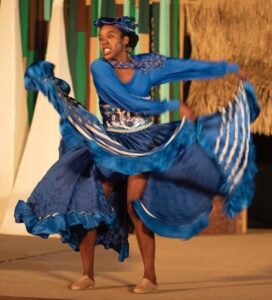By Robert St. Martin
Pomona, California (The Hollywood Times) 07/17/2024
This is the tenth year of the Claremont Summer Shakespeare Festival at Pomona College’s Sontag Greek Theatre in the month of July. This summer features a new bilingual adaptation of Shakespeare’s The Tempest as reimagined in the early days of Spanish colonial Cuba and set on Isla de Pinos off the Coast of Cuba. As directed and adapted by Beatrice Casagrán, from the local theatrical company of Ophelia’s Jump in Upland, Shakespeare’s play is cleverly retold as La Tempestad (or Shakespeare Goes Caribbean) with the original Shakespearean text interspersed with Spanish. One of Shakespeare’s most endearing plays, La Tempestad is a story of betrayal, forgiveness, and magic – all focused around the small island’s magus-ruler, the exiled former Governor-General of Cuba – Prospera.

Yes, Prospera is a woman, although in Shakespeare’s text, Prospero is clearly a man and many a famous Shakespearean actor has taken that part, although Helen Mirren did take on the role as a female Prospero in Julia Taynor’s 1986 film version of The Tempest,which the critics did not much like. Director Beatrice Casagrán has given the play’s leading role to a woman with actor Gabriela de Luna as Prospera. She sees Prospera as a woman suffering from a form of PTSD after her forced removal from rule in Cuba by her own brother Antonio who considered her to be a “witch.” In Spain and Spanish colonial America during the Inquisition, this was the general view of Spanish men about women, especially black or indigenous, who dabbled in practices that they did not approve. In Casagrán’s Cuban interpretation of Prospera’s character, Prospera is secretly an “lyanifa” (or Ifa Priestess) who practices the rituals of the Afro-Cuban Santeria religion. We first see Prospera on stage making a magical spell on the Isla de Pinos. The island is populated with fanciful “orishas” (divine spirits of the Afro-Cuban Yoriba religion of West Africa) – a clear reference to the early importation of African slaves into the Caribbean. In her exile on the Isla de Pinos, she is free to practice her very African religion and its magical powers without interference from domineering men who otherwise would consider her “arts” as witchcraft.

We soon learn that Antonio (Colbert Alembert), her jealous and ambitious brother had plotted with Alonso (Chris Gomez), the Viceroy of Neuva España (Mexico) to overthrow and exile Prospera. They accuse Prospera of being a witch named Sycorax. After catching her at her magical arts, they, assault her – banishing her and her 3-year-old daughter Miranda from Cuba. Set adrift in a small boat, they risk drowning in the sea but they manage to wash up on the deserted shore of Isla de Pinos, where they are helped by a magical sprit named Ariel (Brenda Nascimento), who, according to the director, is “Yemaya,” (the most nurturing of all the Orisha and who controls the waters of the sea).

Fast forward to the present where Prospera lives on this deserted island with her 16-year-old daughter Miranda (Thandiwe McMilan) who she brought to the island as an infant in fleeing Santiago de Cuba. Prospera tends to like talking at great length to her daughter Miranda and in so doing, explains to the audience, the reason that they are on this deserted island where Prospera is the ruler through her magical art as learned in books that were brought to the island in her small boat. In this micro-kingdom, Prospera has dominance over Nature with the help of the sprite Ariel, who she liberated from bondage. As I understand it, Sycorax the witch is possibly the “lyanifa” alter-ego of Prospera and the explanation of the back story is changed from Shakespeare’s version.
The background to the story of Prospera and Miranda is only part of the plot and the play does start out a bit talky, but the action begins with the big storm off the coast where a Spanish galleon full of luminaries from the Court of the Viceroy in La Ciudad de Mexico and Santiago de Cuba are tossed about on the waves. As the ship breaks up, all are cast overboard. Conveniently, the ship has on board, Alonso and Antonio. Prospera tells her daughter Miranda that she conjured up the violent storm with her magical powers knowing full well who was on board. Miranda responds: “O, I have suffered / With those that I saw suffer!” she says of the shipwreck (I. ii. 5–6 ), and hearing Prospero’s tale of their narrow escape from Santiago de Cuba, she says “I, not rememb’ring how I cried out then, / Will cry it o’er again.”
On the island is another creature named Caliban (Jorge Goyco Diaz), who is the son of the dead witch Sycorax and he is now a slave of Prospera – relegated to the hard physical tasks of gathering firewood and whatever else Prospera demands. Caliban’s resentment towards Prospera is captured in his famous lines: “You taught me language and my profit on’t / Is I know how to curse.” Caliban’s ape-like movements mirror his stature as a creature considered less that human. He is continually tormented by Prospera by invisible pinching whenever he challenges any of Prospera’s commands. We are told that Caliban once tried to accost young Miranda and for that infraction, he is not permitted anywhere near her. Of course, the true nature of Caliban’s origin is reserved for discovery at the end of the play.

In response to Miranda’s pleading for the people thought lost in the storm at sea, Prospera commands Ariel to make sure that they all survive and make it to shore – although in different locations without knowledge of each other’s survival. Of course, that pacts in a goodly share of Act I of this charming interpretation of Shakespeare’s The Tempest. Ariel sings, as she does in the Shakespeare’s original, but her sexuality is clearly non-binary and her songs Afro-Cuban in flavor. The Orishas (Mariana Ataveira, Andrea Lara and Thandiwe McMillan) exercise their influence on the happenings of the island through Afro-Cuban music and dance – choreographed y by Kati Hernandez, with music by Cuban musicians and composers Andes Vadín (guitar) and Arturo Stable (percussion) who perform Afro-Cuban influence music throughout the production.

This magical tale has several subplots and they are scattered amongst the groups on Prospera’s island. The scheming Antonio & Alonso are left in one part of the island with their shipmate Gonzalo (Natalia Christabelle), who was the only members of the Cuban Court faithful to Prospera. There are the most amusing drunkards Esteban (Stephan Haci) and Trinculo (Christian Skinner) who are content because of the ready availability of wine washed ashore in barrels. They encounter Caliban on the beach and in some of the play’s most outrageous humor, try to determine is he is a man or a fish. Getting Caliban drunk on wine spurs Caliban to plot the overthrow of his mistress Prospera and enlist the two lowlifes to join in his revenge.
The third subplot and the most romantic is that of Fernando (Stephen Diaz), the princely son of Alonso, Viceroy of Neuva España, who is found alone in a corner of the island and believes that he is the only survivor of the shipwreck. He wandered in the cave hut of Prospera with the magic guidance of Ariel and there sees the beautiful Miranda, who has never set eyes on a man other than the creature Caliban. Miranda, who has seen no humans in her life other than Prospera and Caliban, immediately falls in love.
Ferdinand is similarly smitten and reveals his identity as the princely offspring of the Viceroy of Neuva España. Prospera tries to temper their immediate fascination with each other and counsels a necessary distancing, assigning Fernando the strenuous physical tasks needed on the island as Caliban is being reticent. At the play’s end, Miranda will see all the survivors of the shipwreck and express her bewonderment: “Oh, wonder! How many goodly creatures are there here! How beauteous mankind is! O brave new world, that has such people in’t.”

In Shakespeare’s late romances, the theme of forgiveness is crucial to an understanding of how the disparate plotlines come together. Prospera’s magical powers have their limits and her main concern is for the happiness of her daughter Miranda. By casting Prospero as a woman and a very Cuban mother, the production captures the strength of Latin women as it stems from stature of the high priestesses of Yoruba religion but also as it challenges the assumed dominance of men in positions of power. Knowledge is power and Prospera’s books (or, in this case, her knowledge of “Ifa” religious practices) do make a difference. What is charming in this production is how Gabriela de Luna reveals the tenderness of a mother towards her daughter with the infusion of Spanish terms of endearment. Prospera speaks to the sprit Ariel similarly with Spanish commands that reflect their very special connection in the world of magical power.

Much can be said about this ambitious production of Shakespeare’s The Tempest that requires the casting of mostly Spanish-fluent actors for the major roles. The Orishas in the play learned their dance moves under the tutelage of choreographer Kati Hernandez – and their lithe bodies capture the very real feeling of the Santeria religious rituals in Cuba. The references within this production are deep and probably most enjoyable for those familiar with Cuban culture but they certainly do bring to this production a special musical/dance blend that is enthralling. Definitely this production of La Tempestad with Ophelia’s Jump Company at the Summer Shakespeare Festival in Claremont is worth the ticket.
La Tempestad will be staged at the Sontag Greek Theatre of Pomona College in Claremont on July 12, 14, 18, 20 at 8:00 pm, alternating with the other production of The Knight of the Burning Pestle. Tickets are $40 for General Admission; $25 for College and High School Students with ID; and Children (10 and under) free with accompanying general admission adult ticket. For tickets and more information, go to: https://app.arts-people.com/index.php?actions=4&p=1





